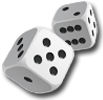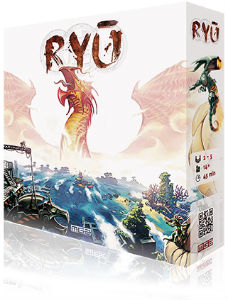



play board games
Board game reviews, strategy tips & session reports
RYU Board Game Review
 Stats:
Stats:
No. of players: 2-5
Amount of time to play: 45-60 min
Age requirements: 10+
Set-up time: 5 min
RYU is a resource management game with a rondel and drafting mechanic. Can you gather resources and build your dragon before your opponents?
RYU Rules Description:
In RYU you play one of five nations that must build a dragon spaceship. You do this by gathering resources and building the five sections of your dragon one at a time.
The board is made up of nine island hexes that are placed in a random order in a circle. Five belong to each nation and four neutral islands. If you have less than five players there are special tiles for the nations that weren’t chosen. You must place the appropriate cubes in the bag depending on the number of players. Cubes come in five colors that matter when you build your dragon.
You start the game with two yellow cubes and depending on turn order you might get a merchant or smuggler token (more on them later). You also have an exploration token.
On your turn you may take an action and move up to two hexes, move up to two hexes and take an action or move up to four hexes. You action options are; explore, build, or use one of the neutral islands.
When you explore you discard one yellow cube to the center of the table and take a merchant token. Then if you are exploring an active player’s island you flip your exploration token (like a coin). If it shows four cubes you draw four cubes from the bag and take one. The player whose island you are on takes two of the drawn cubes and you get the remaining one. If the exploration token shows five cubes you draw them. The player that owns the explored island splits them into two piles and the active player takes a pile. The other pile goes to the owner of the island. When exploring a non-active nation’s island you just draw two cubes from the bag. Then you flip the island to its inactive side. If all islands are inactive flip over all islands back to their active side except the one that was just explored.
When you build your dragon it must be built in order from A to E. Different sections cost different amounts of certain colored cubes. You can use a governor token a substitute for any one cube (more on those in a bit). Cubes used to build your dragon are discarded to the center of the table.
The four neutral islands are the Smuggler’s Guild, Merchant Guild, Bazaar and Governor’s Island. On the Smuggler’s Guild you can either discard a yellow cube to draw a cube from the bag and gain two smuggler tokens. Or discard as many cubes as they wish in exchange for an equal number of smuggler and/or merchants tokens. At the merchant’s guild you may discard two yellow cubes for a governor token or spend one merchant and one smuggler token for a yellow cube. The Bazaar lets players spend three merchant tokens for one governor token or spend three smuggler tokens to draw two cubes from the bag. On Governor’s Island you may spend a merchant token to flip a player island. Or you may spend a smuggler token to force one player to reveal the cubes they have behind their screen.
A player may never have more than five of one token type. Your tokens and dragon are public knowledge. But the cubes you have are kept secret.
There is one white cube in the bag. When it is drawn all players secretly bid cubes from behind their screen. The white cube must be bid. The payer that bids the most cubes discards them and immediately builds the next section of their dragon. Then all other players must discard the cubes they bid. But they get to take one merchant or smuggler token for each cube they bid. If the highest bid is a tie no one builds their dragon and everyone discards their cubes for tokens. Then all cubes in the middle of the table are added back into the bag.
Play continues until one player builds their last dragon section. Then play ends immediately and they are the winner.
A Quick Review of RYU:
RYU is about gathering resources and being able to build your dragon first. So gathering resources efficiently matters. But you only have limited control over what you gather.
The components for this game are really nice. In fact the box art is amazing. The rest of the artwork is hit and miss though (more on that later). The dragon player pieces are cool too. The rules are pretty good but I had to read them a couple times to get a handle on them. Something that was particularly confusing to me was flipping the exploration tokens. Since you flip active tiles over I was not sure what it meant to flip your exploration token. Thus why I wrote above like a coin. But I saw a play online and it made more sense to me then.
The way you draft cubes is cool. You might get more cubes by exploring another players island, but you might not get what you want and you might help them gather the resource they need.
Governor tokens give you the opportunity to build sections of your dragon even if you don’t have the exact cubes required. This can help if you have trouble pulling the cubes you need and to take some of the randomness out of this game.
Speaking of being random RYU can be pretty random. So keep that in mind. Some people won’t mind the amount of randomness in this game. Other players will feel little control over what they draw from the bag.
This game can feel a bit too repetitive. Each turn is a bit too much the same as the last. It is a fairly light-weight board game that usually plays fairly quickly. But I wish there was a bit more variation in the things you could do.
Given its weight and the time a turn and the entire game takes, this game might be good for families. That is if you don’t mind the artwork. Nothing is offensive but females are scantily clad. It just seems like a disconnect between the audience and execution.
If you are looking into purchasing RYU, I’d suggest you try it first. It is not a bad game but not my cup of tea. I could see playing it with my kids if the artwork was different. But you night have older kids or not care about the artwork.
Score and synopsis: (Click here for an explanation of these review categories.)
Strategy 3 out of 6
Luck 5 out of 6
Player Interaction 4 out of 6
Replay Value 4 out of 6
Complexity 3 out of 6
Fun 3 out of 6
Overall 3 out of 6

Leave a Reply